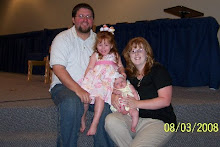The following article is from the March 17, 2008 edition of the Barna Update. It was a 1000 person survey about people's most important relationships. When looking at Barna's results I ask that you first, take stats for what they are.........stats. A thousand people obviously don't speak for an entire nation, but it's a good starting point for us to look at a couple of things. Secondly, I ask that you keep the following two items in mind while reading Barna's results.
1. Each individual church should examine herself and see if any of the following applies to them. & 2. If these stats do apply then that church should take a good hard look at the message being given to her people.
(Ventura, CA) Americans have a global reputation for being religious people, but a new study from The Barna Group indicates that people’s most important personal relationship is not with God. Family surpassed their Heavenly Father as the key personal connection. However, when asked to identify the most important group or network in their life, colleagues from their church topped the list, mentioned by three out of every ten adults.
Most Important Relationship
Adults are clearly most focused on their family in terms of important relationships. Overall, seven out of ten adults mentioned family or family members as their most significant connection. One-third said their entire nuclear family is tops, while one-quarter (22%) named their spouse and one-sixth (17%) identified their children. (An additional 3% mentioned their parents as their key relationship.)
The only other relationship mentioned by at least 3% was various iterations of people’s deity. God, Jesus Christ, Allah, and the Trinity were among the names listed by one out of every five adults (19%).
Surprisingly, just 2% of adults said a specific friend represented their most important personal relationship.
Among the related findings were:
The people most likely to list God were 40 or older.
Political conservatives were almost three times as likely as political liberals to identify God as their most important relationship (33% vs. 12%, respectively).
People in the Midwest were only half as likely as residents of the West and Northeast to say their children are their most important relationship.
The only subgroup for which at least one-third said God was their most significant relationship was evangelicals, among whom 70% listed God.
Thirty percent of Protestants listed God as their most important connection. In contrast, just 9% of Catholics did so.
Blacks were about twice as likely as all other Americans to describe their bond with God as their most important relationship.
Women were nearly twice as likely as men to list their children as their most important relationship.
Most Significant Groups
Although adults listed numerous groups or networks that they deem to be most important, those groups generally fit into five categories. Three out of every ten adults (29%) said their church was the most significant group affiliation. The people they affiliate with at their place of work represented the top choice for two out of every ten people (18%), followed by loose associations of friends that regularly gather together (14%), a hobby club or social group (12%) and interaction with people in the neighborhood (7%).
Various subgroups displayed divergent priorities.
People 25 or younger listed friends as their most critical network; church ranked fifth on their hierarchy. In contrast, adults over 25 ranked church as their key social group, followed by their work relationships.
Three-quarters of evangelicals (74%) said their church was their main social network. They were the only population segment from which half or more identified a given network. Atheists and agnostics were most likely to rate their workplace as their top network. Notional Christians were evenly divided, with one-fifth identifying work, one-fifth mentioning their church, and one-fifth listing friends.
Unexpectedly, residents of the West were more likely to list their church group than any other group.
While 44% of Protestants said their church was the prime social group in their life, only 16% of Catholics concurred. Among Catholics, their church ranked as the third most significant social group.
Political conservatives were more than twice as likely as political liberals to position their church as their central social group. Liberals were nearly evenly divided among work, social clubs, friends and church as their dominant social associations.
Interesting Patterns
George Barna, leader of the company that conducted the research, highlighted several intriguing outcomes.
"People were more than 50% more likely to say that their church’s congregation is their most significant group than to say that God represents their most important personal connection. That certainly reflects the interpersonal comfort that millions of people have developed at their church, but also indicates that people may have forgotten the ultimate reason for belonging to a Christian church."
In Christ Alone,
Mr. V.
Subscribe to:
Post Comments (Atom)




No comments:
Post a Comment